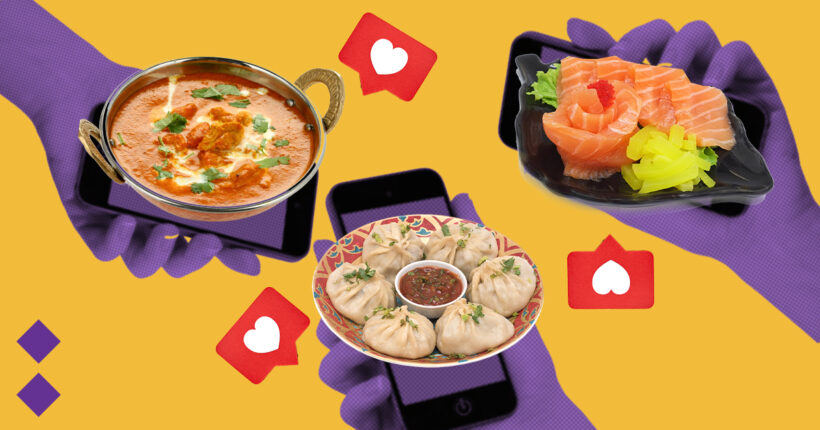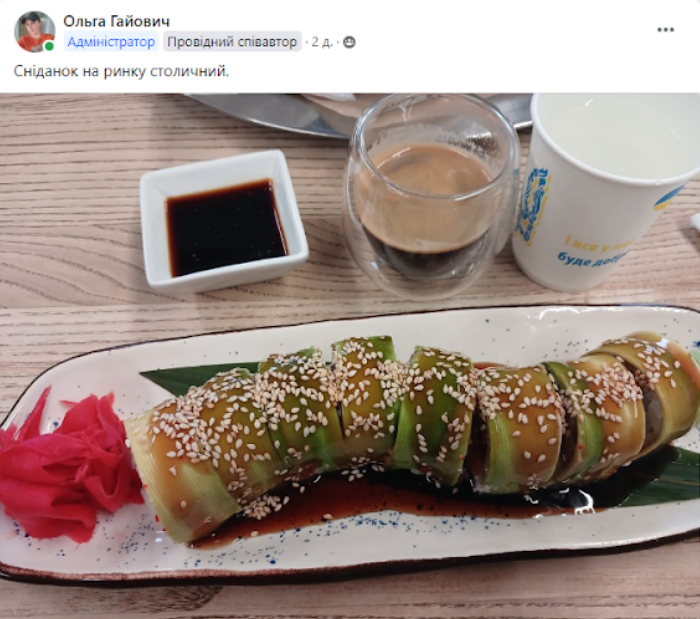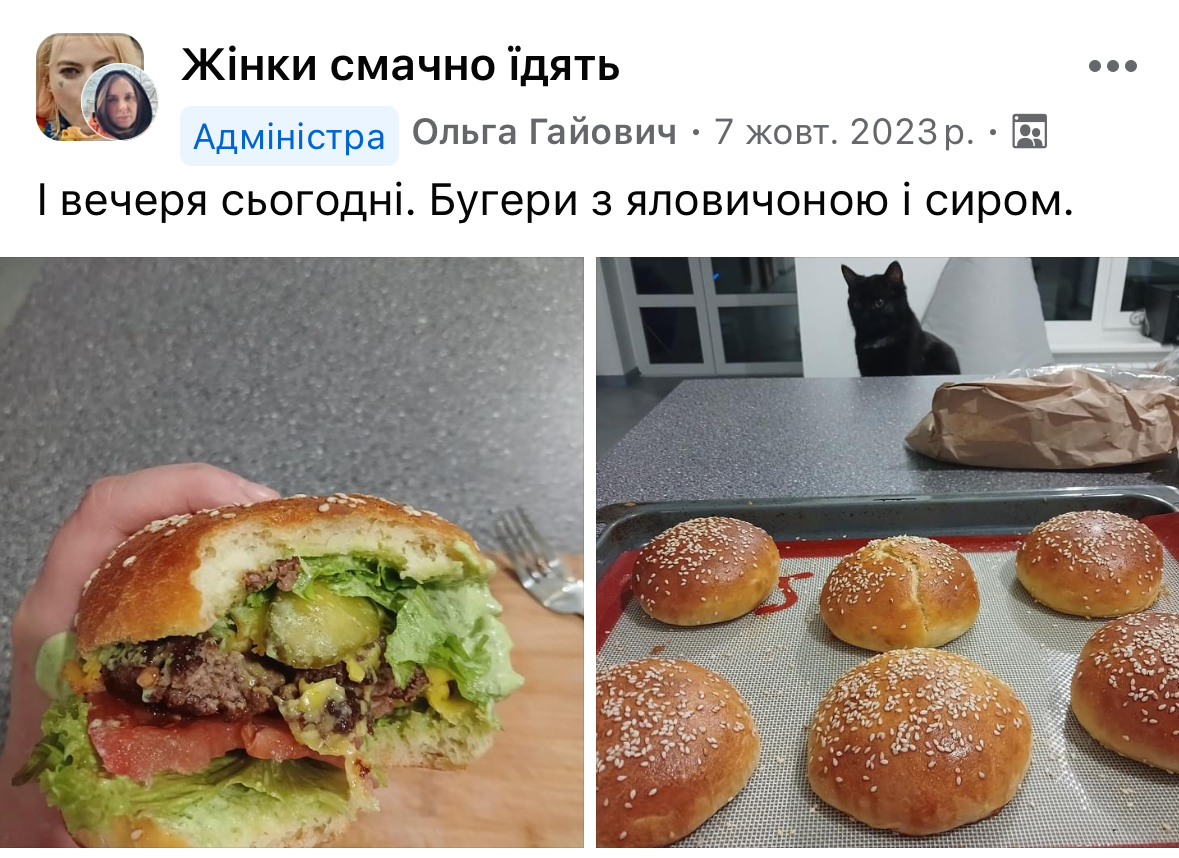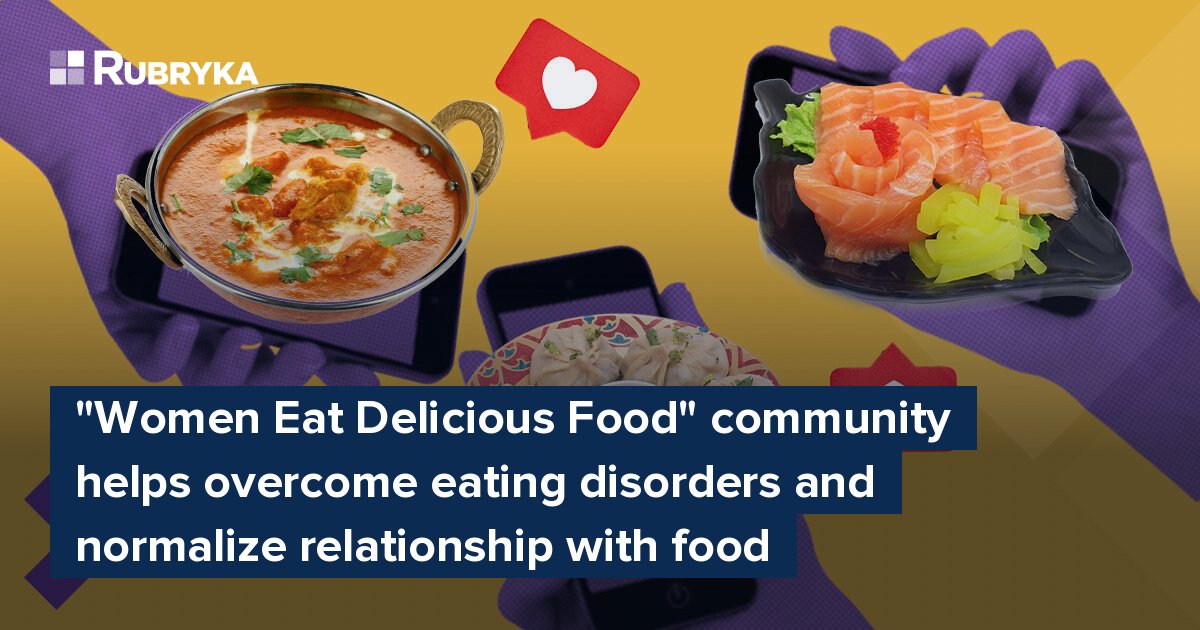
The community "Women Eat Delicious Food" was created three years ago by the feminist Olha Hayovych. Its communication condition is to display dishes cooked or purchased exclusively for yourself and not criticize female colleagues. What is the meaning of this group? What women's problems does it solve? Let's find out together.
*Since the group "Women eat deliciously" is private, we only post the posts of Olha Hayovych, who permitted us to do so.
What is the problem?
Olha Hayovych is a hearing aid technician and selects hearing aids and equipment to improve hearing. Five years ago, she got involved in public activities and attended various events where she and her colleague defended women's rights. Later, Hayovych began to organize actions herself. Human rights is not her only passion, another one is cooking.

Olha Hayovych at one of the rallies. Photo from Hayovych's personal archive
There has been a lot of hate in cooking communities online. These groups had an unpleasant audience and poor moderation, which is why there was so much aggression among subscribers.
Therefore, Hayovych created the group "Women Eat Delicious Food," where you could freely post pictures of your own, store-bought, or restaurant dishes.
Hayovych also has two more groups: "Women Live Freely," where subscribers communicate and support each other, and Antiberehyni, which advocates for women's reproductive rights.
What is the solution?
"Women Eat Delicious Food" is a private Facebook group. All participants post pictures of their food — any recipes or purchased food/drink. Others are happy to respond to the post: put reactions, write comments, or ask questions about the recipe.

Post in "Women Eat Delicious Food" by Olha Hayovych. Having breakfast at one of Kyiv's food markets. Screenshot from a closed community
"The idea is to publish not only what you cooked yourself but also some kind of chocolate you wanted to eat. It can be an easy dish, so you don't have to worry. It can be fast food, and vice versa, something complicated," says the community's founder.
The group has a rule not to criticize the posts of female colleagues (the moderators monitor this) and to post what you eat yourself. In this way, participants receive emotional support from their colleagues.
"This is non-professional help, but simply as support of a friend who is always on the topic," says Hayovych.
The group's founder says that the main thing is the satisfaction, physical and aesthetic, that the subscriber receives, who eats what she wants and posts about it.
Does this solution really work?
The group has existed for about three years and has almost 4,000 subscribers. Hayovych says that each of them independently decided to become a community member. They never advertised or promoted the group.
"I joined the group in May 2022. I was interested in the topic, and the emphasis was on the pleasure of delicious food. There are many culinary groups on Facebook, but I only read this one. I post ordinary dishes and everyday meals, which I want to share with the participants. It's just a manifestation of yourself and a pleasant online time," says Yuliia Nemyrovska, subscriber and moderator of "Women Eat Delicious Food."
Hayovych published the announcement about the recruitment of moderators to the community. Nemyrovska volunteered because she already had the experience of moderating the culinary community, and "Women Eat Delicious Food" is the group she visits the most.
The morning for Nemyrovska starts with checking posts and comments because there are girls from different time zones in the group, and while she sleeps, they communicate. Communication provides an opportunity to distract yourself from everyday life, learn about something new for yourself, and adopt various life hacks for cooking or eating food. The girls also share their pleasant (or not-so) events in life. "In general, the group creates a sense of unity," shares Nemyrovska.
Hayovych says that the primary purpose of creating this community was a sense of unity or sisterhood among women, as well as defending their right to eat whatever they wanted.

Post in "Women Eat Delicious Food" by Olha Hayovych. Chebureks for dinner. Screenshot from the closed community
"Many women are thankful for the community because girls who are traumatized by the belief that women should eat little read us. Among the subscribers, some have eating disorders, and our group helps them overcome this. You can eat a lot and with pleasure," says Hayovych.
Where does the hate come from?
Hayovych says that among her three groups, the most hate occurs in "Women Eat Delicious Food" because subscribers do not always carefully familiarize themselves with the conditions for creating posts in the community. They want to share what they have cooked for someone — a child or a husband and describe some situations from life that are unrelated to the group's topic.
"We focus on what women eat deliciously. We need to publish about ourselves, and we are all traumatized by patriarchy and expectations from women," Hayovysh shares with Rubryka. "It is very difficult for us to keep the focus on ourselves. Therefore, we delete posts that are not about ourselves. Subscribers take it close to their hearts. One woman wrote that the food tastes better when eating with her husband, and we are taking away from her the joy of eating with her loved one because she cannot write about him." Also, one of the main rules of the group is not to criticize. The moderators delete all comments with insults and negativity.

Post in "Women Eat Delicious Food" by Olha Hayovych. Notification for group participants about the ban on posts about weightloss and other food restrictions. Screenshot from the closed community
"People are not used to the fact that something is moderated on Facebook, that if you come and post something bad, it will be removed. Some accept it normally, and others react very negatively," Hayovych shares.
What other situations arose
Hayovych says that various, sometimes curious and funny, situations have occurred over the past three years. The founder says: "We are a small but scandalous group."
Hayovych recalls the situation that arose with the leek. The group participants posted their dishes prepared with this plant in the spring. But eco-activists reacted to these posts, noting that according to Ukrainian law, leek cannot be used, even if you've grown it yoursef.
"I wrote a request to my subscribers that we no longer post about leek, but some participants began to make posts with it on purpose. We have removed these subscribers, and they started to hate us even outside the group," says Hayovych.
She also mentions the Dniester salad flash mob. The dish is made from white cabbage, semi-smoked sausage, canned peas, and mayonnaise. At one time, subscribers posted tens or hundreds of posts with this dish.
"Dniester was posted day after day, and the participants were still happy with each post. After that flash mob, I sometimes cook it, too. Although I'm a culinary snob, this salad is delicious," says Hayovych.
She also actively publishes her food on "Women Eat Delicious Food."
"I love shawarma. I like dumplings with pork rinds. I love eclairs. You publish a post, the girls are happy for you, and they provide some kind of psychological support. Somehow, it makes your heart light," the heroine shares.

Post in "Women Eat Delicious Food" by Olha Hayovych. Burgers with beef and cheese. Screenshot from the closed community
"Eating disorders are associated with self-criticism, self-condemnation, and self-limitations"
Olha Lazarenko, the candidate of psychological sciences and head of the Volyn branch of the National Association of Doctors and Psychologists "Eating disorder: therapy and prevention," came across the group "Women Eat Delicious Food" by chance. The specialist was looking for an example of a community in the Ukrainian informational space where relations with food are normalized.
"A person in recovery needs to be referred to a community that broadcasts a healthy relationship with food. I came across the group 'Women Eat Delicious Food' because it is the focus of my professional interest," Lazarenko says. She was surprised by the administration's position, which creates an atmosphere of complete acceptance of everything a person eats. There are separate rules — don't post about diets or write about which food is bad and which is good.
According to the specialist, a person is a social being guided by society's opinion. When unhealthy relationships with food are broadcast through various means (diets, the principle of bad and good food, etc.), a person picks it up.

Olha Lazarenko, psychologist, candidate of psychological sciences, supervisor, head of the Volyn branch of the National Association of Doctors and Psychologists "Eating disorder: Therapy and Prevention." Photo from the network
There is a perception that being overweight is associated with health problems or that you are lazy, not hardworking, not purposeful. Everything leads to the topic of losing weight: dividing food, cutting portions — a person changes their diet. Eating disorders are associated with self-criticism, self-condemnation, and self-limitations, and the group confronts and denies all these false assumptions. It also normalizes a healthy approach to nutrition.
Lazarenko says it is normal to feel hungry; it's okay to cook what you love; not limiting yourself to diets is normal; tasty food for joy is also a resource — mental and physical. The group's community subscribers support all these statements.
"When you see that thousands of people in the group adhere to these principles, it reassures you. Anxiety decreases, and reconciliation with oneself occurs. Especially since the group still has quite a warm audience that supports you," Lazarenko continues. "The community seems like a very resourceful place. I remember one case: after the start of a full-scale war, at one point, all the subscribers started posting Ukrainian borscht, and I was abroad with my child. It felt so much like home."

How the "Moim. Ridnym" project empowers retired women to create for the army and home

"If at least one person gets rid of stereotypes — we are doing everything right": inclusive model school works during the war in Ukraine

Scrap by scrap: weaving together the stories of those waiting for loved ones at war





